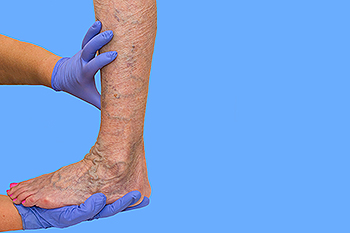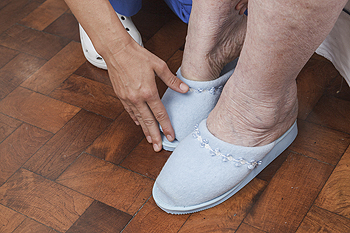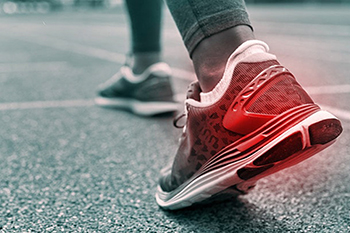Connect With Us
Items filtered by date: December 2023
How Does a Podiatrist Assess Vascular Disease?

Podiatrists play a pivotal role in assessing vascular disease, a condition that impacts blood circulation throughout the body, including the lower extremities. A thorough examination begins with a detailed medical history, as podiatrists inquire about symptoms such as leg pain, cramping, or numbness. Clinical assessment involves inspecting skin color, temperature, and the presence of wounds or ulcers on the feet, key indicators of compromised blood flow. Podiatrists employ palpation techniques to evaluate pulses in the feet, gauging the strength and regularity of blood flow. The capillary refill test assesses the time it takes for color to return to the toenails after gentle pressure, providing insights into microcirculation. In cases of suspected vascular disease, podiatrists may collaborate with vascular specialists for more advanced diagnostic tests such as Doppler ultrasound or angiography. If you have poor circulation, it is suggested that you schedule an appointment with a podiatrist who can effectively diagnose and treat vascular disease.
Vascular testing plays an important part in diagnosing disease like peripheral artery disease. If you have symptoms of peripheral artery disease, or diabetes, consult with Ali Davis, DPM from The Foot Clinic. Our doctor will assess your condition and provide you with quality foot and ankle treatment.
What Is Vascular Testing?
Vascular testing checks for how well blood circulation is in the veins and arteries. This is most often done to determine and treat a patient for peripheral artery disease (PAD), stroke, and aneurysms. Podiatrists utilize vascular testing when a patient has symptoms of PAD or if they believe they might. If a patient has diabetes, a podiatrist may determine a vascular test to be prudent to check for poor blood circulation.
How Is it Conducted?
Most forms of vascular testing are non-invasive. Podiatrists will first conduct a visual inspection for any wounds, discoloration, and any abnormal signs prior to a vascular test.
The most common tests include:
- Ankle-Brachial Index (ABI) examination
- Doppler examination
- Pedal pulses
These tests are safe, painless, and easy to do. Once finished, the podiatrist can then provide a diagnosis and the best course for treatment.
If you have any questions, please feel free to contact our office located in Overland Park, KS . We offer the newest diagnostic and treatment technologies for all your foot care needs.
Common Causes of Foot Pain in Seniors

As people age, foot pain becomes increasingly prevalent, affecting one-quarter of those aged 45 or older. Primarily concentrated in the forefoot and toes, this discomfort impedes mobility and balance, raising the risk of falls. Common foot problems among seniors stem from overuse and are influenced by factors such as foot structure, activity level, body weight, and footwear choices. Plantar fasciitis, an inflammation of the ligament that runs from heel to ball of the foot, often results in pain in the heel and arch. Osteoarthritis, a degenerative disease attacking joint cartilage and bone, often targets the ankle, the middle of the foot, and the big toe. Bunions, or hallux valgus, painful bony formations on the big toe joint, are influenced by heredity and can be worsened by years of wearing ill-fitting shoes. Hammer toes, deformity of the smaller toes, often result from tight shoes or inadequate support, especially in individuals with flat feet. Seniors may also experience foot pain due to a decrease in padding on the ball and heel of the foot, as collagen diminishes with age. Early intervention and proper care can alleviate discomfort, improve mobility, and reduce fall risks. Your feet are your foundation, and caring for them ensures a healthier and more active lifestyle as you age. If persistent foot pain is a concern, it is suggested that you make an appointment with a podiatrist.
Proper foot care is something many older adults forget to consider. If you have any concerns about your feet and ankles, contact Ali Davis, DPM from The Foot Clinic. Our doctor can provide the care you need to keep you pain-free and on your feet.
The Elderly and Their Feet
As we age we start to notice many changes in our body, but the elder population may not notice them right away. Medical conditions may prevent the elderly to take notice of their foot health right away. Poor vision is a lead contributor to not taking action for the elderly.
Common Conditions
- Neuropathy – can reduce feeling in the feet and can hide many life-threatening medical conditions.
- Reduced flexibility – prevents the ability of proper toenail trimming, and foot cleaning. If left untreated, it may lead to further medical issues.
- Foot sores – amongst the older population can be serious before they are discovered. Some of the problematic conditions they may face are:
- Gouging toenails affecting nearby toe
- Shoes that don’t fit properly
- Pressure sores
- Loss of circulation in legs & feet
- Edema & swelling of feet and ankles
Susceptible Infections
Diabetes and poor circulation can cause general loss of sensitivity over the years, turning a simple cut into a serious issue.
If you have any questions please feel free to contact our office located in Overland Park, KS . We offer the newest diagnostic and treatment technologies for all your foot and ankle needs.
Considerations for Choosing Running Shoes

Selecting the right pair of running shoes is paramount for a comfortable and injury-free experience. When embarking on this journey, consider the shoe's fit as a top priority. The shoe should snugly cradle the foot without causing tightness, allowing for a secure yet comfortable feel. Pay attention to the arch support, ensuring it complements the natural arch of your foot. Cushioning is vital for impact absorption, protecting joints and reducing the risk of injuries. Consider the type of running you engage in, including road running, trail running, or a mix of varied surfaces, and choose shoes tailored to the specific terrain. The heel counter, the back portion supporting the heel, should provide stability. Flexibility is also key. The shoes should bend where your foot naturally does. Lastly, examine the outsole for durability and traction. If you are seeking additional information about what type of running shoes to purchase, it is suggested that you confer with a podiatrist, who can provide you with the knowledge you are seeking.
You should always make sure your running shoes fit properly in order to avoid injury. For more information, contact Ali Davis, DPM from The Foot Clinic. Our doctor can provide the care you need to keep you pain-free and on your feet.
Choosing the Right Running Shoe for Your Foot Type
Improper shoe sizing can cause a myriad of problems for your feet. Shoes that don’t fit you properly can lead to muscular imbalances in your body, which can result in foot, knee, and hip injuries.
Tips for Finding the Right Running Shoe
- Make sure you have a thumb’s width of wiggle room between the end of your longest toe and the front of the shoe.
- There should be little to no slipping at the heel
- Don’t assume your size in one shoe brand will be your size in another
- Do not lace up your shoes too tightly
- Walk around in the store with your new shoes before you buy them
If you have any questions please feel free to contact our our office located in Overland Park, KS . We offer the newest diagnostic and treatment technologies for all your foot and ankle needs.
Podiatric Evaluation of Feet for Exercise

Podiatrists conduct thorough evaluations of feet to optimize exercise outcomes and prevent injuries. This process begins with a detailed assessment of the foot's structure, which includes examining the arch, toe alignment, and overall foot shape. This type of doctor pays close attention to any abnormalities or conditions like flat feet, high arches, or bunions that may impact exercise performance or lead to injury. Gait analysis is another critical aspect, where the podiatrist observes how a person walks and runs. This analysis helps identify any irregularities in foot movement that could cause problems during physical activities. A key part of the evaluation is understanding the individual's exercise routine, including the type of activities they engage in, and the frequency and intensity of these activities. This information, combined with the physical examination, enables the podiatrist to make personalized recommendations. These may include specific types of footwear, custom orthotics, or exercises to strengthen the foot and ankle. If you are exercising or embarking on a new exercise program, it is suggested that you make an appointment with a podiatrist for advice to enhance your comfort, improve performance, and reduce the risk of foot-related injuries during exercise.
Exercising your feet regularly with the proper foot wear is a great way to prevent injuries and build strength. If you have any concerns about your feet, contact Ali Davis, DPM from The Foot Clinic. Our doctor can provide the care you need to keep you pain-free and on your feet.
Exercise for Your Feet
Exercise for your feet can help you gain strength, mobility and flexibility in your feet. They say that strengthening your feet can be just as rewarding as strengthening another part of the body. Your feet are very important, and we often forget about them in our daily tasks. But it is because of our feet that are we able to get going and do what we need to. For those of us fortunate enough to not have any foot problems, it is an important gesture to take care of them to ensure good health in the long run.
Some foot health exercises can include ankle pumps, tip-toeing, toe rises, lifting off the floor doing reps and sets, and flexing the toes. It is best to speak with Our doctor to determine an appropriate regimen for your needs. Everyone’s needs and bodies are different, and the activities required to maintain strength in the feet vary from individual to individual.
Once you get into a routine of doing regular exercise, you may notice a difference in your feet and how strong they may become.
If you have any questions please feel free to contact our office located in Overland Park, KS . We offer the newest diagnostic and treatment technologies for all your foot and ankle needs.
Arthritis Can Cause Pain in the Feet and Ankles
Blog Archives
- April 2025
- March 2025
- February 2025
- January 2025
- December 2024
- November 2024
- October 2024
- September 2024
- August 2024
- July 2024
- June 2024
- May 2024
- April 2024
- March 2024
- February 2024
- January 2024
- December 2023
- November 2023
- October 2023
- September 2023
- August 2023
- July 2023
- June 2023
- May 2023
- April 2023
- March 2023
- February 2023
- January 2023
- December 2022
- November 2022
- October 2022
- September 2022
- August 2022
- July 2022
- June 2022
- May 2022
- April 2022
- March 2022
- February 2022
- January 2022
- December 2021
- November 2021
- October 2021
- September 2021
- August 2021
- July 2021
- June 2021
- May 2021
- April 2021
- March 2021
- February 2021
- January 2021
- December 2020
- November 2020
- October 2020
- September 2020
- August 2020
- July 2020
- June 2020
- May 2020
- April 2020
- March 2020
- February 2020
- January 2020
- December 2019
- November 2019
- October 2019
- September 2019

